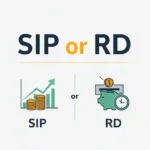Bond funds are vital to a diversified investment plan, providing a more predictable return pattern than equity investments. During an age of market volatility and shifting interest rates, long-term bond funds have become increasingly popular with investors seeking consistent income and capital protection.
In this post, we’ll explore what bond funds are, why they matter, and present a curated list of the top 7 long-term bond funds in India for 2025. (Data as of January 30, 2025)
What Are Bond Funds?
Bond funds are mutual funds or exchange-traded funds (ETFs) that invest in bonds or other fixed-income instruments primarily. They collect money from various investors and use it to buy a diversified portfolio of bonds, including government securities, corporate bonds, or municipal bonds. Some of the major advantages of bond funds are as follows:
- Steady Income: They offer regular interest income through dividend payouts.
- Diversification: Spreading investments across various bonds reduces the risk associated with individual issuers.
- Liquidity: Bond funds are traded on stock exchanges, providing higher liquidity compared to holding individual bonds.
- Professional Management: Experienced fund managers select and manage bond portfolios to optimize risk-return profiles.
Overview of Best Long-Term Bond Funds in India 2025
The following is a detailed table of the major metrics for the best 7 long-term bond funds that are available in India for 2025.

| Fund Name | 3Y Annualised Returns | AUM | Debt Allocation | Minimum SIP Amount | Expense Ratio | Inception Date |
|---|---|---|---|---|---|---|
| UTI Dynamic Fund Bond Direct-Growth | 9.47% | Rs 506.98 crore | 58% sovereign debt, 28.8% financial debt, 13.2% others | Rs 500 | 0.69% | January 1, 2013 |
| UTI Medium to Long Duration Fund Direct-Growth | 8.99% | Rs 313.14 crore | 56.1% sovereign debt, 20.8% financial debt, 6.5% capital goods, 8.5% others | Rs 500 | 1.19% | January 1, 2013 |
| ICICI Prudential Dynamic Bond Direct Plan-Growth | 8.63% | Rs 1,312.84 crore | 48.3% sovereign debt, 18.9% financial debt, 16.4% services, 8.6% others | Not Supported | 0.57% | January 1, 2013 |
| Nippon India Nivesh Lakshya Fund Direct-Growth | 8.21% | Rs 9,411.44 crore | 98.3% sovereign debt, 1.7% others | Rs 100 | 0.30% | July 6, 2018 |
| Aditya Birla Sun Life Dynamic Bond Retail Fund Direct-Growth | 8.14% | Rs 1,716.86 crore | 63.6% sovereign debt, 26.6% financial debt, 9.9% others | Rs 1,000 | 0.64% | January 1, 2013 |
| ICICI Prudential Gilt Fund Fund Direct Plan-Growth | 7.98% | Rs 6,810.77 crore | 68.8% sovereign debt, 20.1% financial debt, 11% others | Rs 1,000 | 0.56% | January 1, 2013 |
| ICICI Prudential All Seasons Bond Fund Direct Plan-Growth | 7.93% | Rs 13,407/28 crore | 51% sovereign debt, 28.7% financial debt, 13.1% others, 7.3% construction debt | Rs 100 | 0.59% | January 1, 2013 |
Data as of January 30, 2025
Conclusion
Long-term bond funds provide a diversified strategy for those looking for stability and periodic income in their portfolio. The above-mentioned funds are some of the best to invest in India for 2025, with each fund possessing its own set of strengths and investment traits.
Whether you are interested in high returns with sovereign debt allocation or cost effectiveness with low expense ratios, knowing these measures can enable you to make a well-informed choice. Remember that though past performance is a guide, matching your investment options with your financial objectives and risk tolerance is the key to long-term success.
Disclaimer: This blog is solely for educational purposes. The securities/investments quoted here are not recommendatory.
Learn More:
- Difference in Expense Ratio Between Direct and Regular Mutual Funds
- Best Small-Cap Index Funds
- 10 Debt Mutual Funds That Outperformed in the Last 1 Year with 10% to 24% Returns
- Best Mutual Funds for Senior Citizens
- Best Green Hydrogen Stocks in India
Frequently Asked Questions (FAQ)
What are bond funds and why should I invest in them?
Bond funds are investment vehicles that pool money to invest in a portfolio of bonds diversified by type, quality, and maturity. They provide steady income, diversification, and professional management, which make them suitable for investors who want lower risk and regular returns.
How do I analyze a bond fund?
While assessing a bond fund, look at aspects like the 3-year annualised returns, assets under management (AUM), debt allocation mix, minimum SIP requirement, expense ratio, and the date of the fund’s launch. These aspects reflect the performance and risk handling of the fund.
Do bond funds assist in market volatility?
Yes, bond funds can be a cushion in times of market fluctuations. They are less risky than equity funds, and they will stabilize your portfolio in times of economic decline.
What do I need to consider before opening an SIP in bond funds?
Prior to opening a Systematic Investment Plan (SIP) in bond funds, determine your risk appetite, investment time frame, and overall financial objectives. Also, look into the fund’s expense ratio and minimum SIP to ascertain if they match your investment plan.
Are these bond funds appropriate for long-term investments?
Absolutely. The funds listed in this guide are designed with a long-term investment horizon in mind, focusing on steady income and capital preservation over extended periods.









